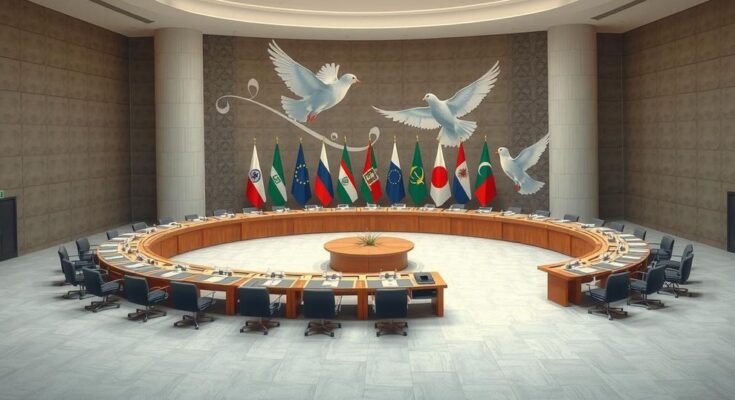Dmitry Polyanskiy, Russia’s UN representative, criticized Biden’s administration for exacerbating the Ukraine conflict and contrasted it with Trump’s pragmatic approach. He acknowledged Saudi Arabia’s role in facilitating diplomatic discussions and highlighted Russia’s commitment to resolving regional conflicts through cooperation. Polyanskiy also addressed issues in Gaza and Sudan, advocating for balanced and humanitarian-focused diplomacy.
In a recent interview on the Arab News program “Frankly Speaking,” Dmitry Polyanskiy, Russia’s first deputy permanent representative to the UN, criticized the administration of former US President Joe Biden for exacerbating the Ukraine conflict. Polyanskiy noted that the Biden administration has acted in a manner detrimental to resolution efforts, labeling it as part of the problem rather than the solution. He attributed the escalation of hostilities to the U.S.’s provocative actions against Russia, which he contends led to Moscow’s military operation in Ukraine beginning February 2022.
Polyanskiy contrasted this with the approach of former President Donald Trump’s administration, which he described as more pragmatic, acknowledging the realities on the battlefield. He stated, “The Trump administration views it absolutely differently, and this is the right approach.” He indicated that Trump’s perspective could potentially facilitate a more realistic and peaceful solution to the ongoing conflict. Furthermore, recent talks in Riyadh proposed a ceasefire over the Black Sea in return for easing sanctions on Russia, establishing Saudi Arabia as a crucial diplomatic player in this matter.
Polyanskiy expressed appreciation for Saudi Arabia’s diplomatic efforts in facilitating talks addressing not only Ukraine but other regional conflicts, including Gaza. He emphasized, “My country has always been consistent in this… saying that the Palestinian problem should not be sidelined,” highlighting Russia’s stance on the need for a two-state solution as a fundamental principle in resolving such disagreements. However, he pointed out the limitations of Russia’s influence in pressuring Israel compared to the United States.
When discussing the crisis in Sudan, Polyanskiy conveyed Russia’s support for the Sudanese government amid ongoing conflict, while stressing the need for a balanced approach in addressing humanitarian issues without equating opposing forces. He articulated Russia’s veto of a UN resolution calling for a ceasefire due to concerns about foreign influence and emphasized that issues such as famine should not be politicized.
Turning to Syria, Polyanskiy discussed the challenges following the potential ousting of Bashar Assad. He affirmed Russia’s commitment to a peaceful transition in Syria, focusing on combating terrorism and maintaining strong ties between Russia and Syria. Despite uncertainties regarding Assad’s future, he emphasized the importance of addressing the needs and stability of the Syrian people rather than engaging in hypothetical scenarios.
Dmitry Polyanskiy’s remarks provide a comprehensive view of Russia’s perspective on the Ukraine crisis, emphasizing the role of U.S. administrations in the conflict. He highlights Saudi Arabia’s emergence as a diplomatic force in facilitating discussions on Ukraine and other regional crises. Moreover, Polyanskiy sheds light on Russia’s positions on Gaza and Sudan, advocating for a balanced approach to international diplomacy and humanitarian issues, ultimately underscoring the importance of long-standing relationships between nations. Engaging in multi-faceted discussions in Riyadh underscores a new approach to resolving persistent global tensions and reflects Russia’s commitment to diplomatic dialogue.
Original Source: www.arabnews.jp




